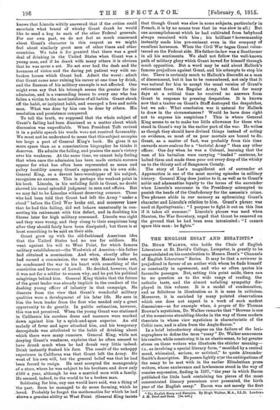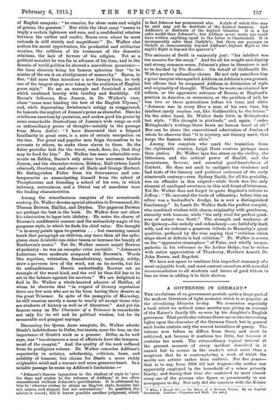THE ENGLISH ESSAY AND ESSAYISTS.* . Dn. HUGH WALKER, who
holds the Chair of English Literature at St. David's College, Lampeter, is greatly to be congratulated on his contribution to Messrs. Dent's " Channels of English Literature" Series. It may be that a reviewer is prejudiced in favour of an author with whom he finds himself so constantly in agreement, and who so often quotes his favourite passages. But, setting this point aside, there can be no question as to the wide range of reading, the catholic taste, and the almost unfailing sympathy dis- played in this volume. It is a model of condensation, and as felicitous in illustration as it is sane in criticism, Moreover, it is enriched by many pointed observations which one does not expect in a work of such modest dimensions—as for example when, a propos of Sir Thomas Brown's mysticism, Dr. Walker remarks that " Browne is one of the numerous stumbling-blocks in the way of those modern theorists in whose view mysticism is characteristic of the Celtic race, and is alien from the Anglo-Saxon."
In a brief introductory chapter on the failure of the lexi- cographers to define the term "essay" Dr. Walker announces his resolve, while construing it in an elastic sense, to lay greater stress on those writers who illustrate the stricter meaning- i.e.. as involving a special literary form," moulded by a central mood, whimsical, serious, or satirical," to quote Alexander Smith's description. He passes lightly ce-nr the anticipations of the essay to be met with in the earlier Elizabethan prose writers, whose exuberance and lawlessness stood in the way of concise expression, finding in 1597." the year in which Bacon published the little book containing ten pieces of the most concentrated literary pemmican ever presented, the birth year of the English camp." Bacon was not merely the first • The Englieh Essay and Essayists. By Hugh Walker. M.A., LL.D. London*
J. H. Dent end San. [U. net.J
Of English essayists " he remains, for sheer mass and weight of genius, the greatest." But while the ideal essay "seems to imply a certain lightness and ease, and a confidential relation between the anther and reader, Bacon even where he most unbends is still stately and magnificent." Dr. Walker also notices his moral opportunism, his prudential and utilitarian maxims, the coldness of his treatment of the domestic relations, the lack of fervour of his religion. Yet as a political moralist he was far in advance of his time, and in the domain of world-politics he showed a marvellous prescience— the locus classic= being his famous aphorism that "to be master of the sea is an abridgement of monarchy." Bacon, in fine, "did more than introduce a new literary form, he took one of the longest steps ever taken in the evolution of English prose style." He Bet an example and famished a model which combined brevity with lucidity and flexibility. Of Bacon's followers, Ben Jenson, in Dr. Walker's view, alone "came near bending the bow of the English Ulysses," and, while deprecating Swinburne's eulogy as exaggerated, he laments the neglect of Jonson's prose HO shameful. Here he reinforces assertion by quotation, and makes good his praise by some remarkable illustrations of Jonson's wide range as well as extraordinary power of thought—notably in the passage from idores Aulici "I have discovered that a feigned familiarity in great ones, is a note of certain usurpation on the less. For great and popular men feign themselves to be servants to others, to make these slaves to them. So the fisher provides bait for the trout, roach, dace, dm, that they may be food for him." Dr. Walker has some admirable com- ments on Selden, Bacon's only other true successor besides Jenson, and the character-writers, Dekker, Hall (whom Lamb admired), Overhury, and above all Earle and George Herbert. He distinguishes Fuller from his forerunners and con- temporaries as emancipating himself from the school of Theophrastus and founding a school of his own, in which intimacy, naturalness, and a liberal use of anecdotes were the leading characteristics.
Among the miscellaneous essayists of the seventeenth century, Dr. Walker devotes special attention to Drummond, Sir Thomas Browne, Halifax, and Dryden. The pages on Browne are perhaps the best in the book. Dr. Walker does not allow his admiration to lapse into idolatry. He notes the charm of Br'own's confidential manner and the melancholy magic of his gorgeous style, in which he finds his chief value. His thought "is in many points open to question . . . but reasoning cannot touch that paragraph on oblivion, any more than all the syllo- gisms since Aristotle can either lessen or increase the beauty of Beethoven's music." Yet Dr. Walker cannot acquit Browne of pedantry: he was an exemplar roitits imitabile. "Johnson's Latinisms were moderate compared with Brown's. Words like ergotism, volutation, funambnlatory, innitency, orbity, show a perverse love of the word, not on its merits, but for its outlandishness. Herein undoubtedly Browne set an example of the worst kind, and the evil he thus did has to be act in the balance against his services?' We are delighted to Lad in Dr. Walker a whole-hearted admirer of Halifax, of whom he observes that "in respect of literary reputation there are few men who are so far from having their deserts as the great Trimmer. In spite of the panegyric of Macaulay, he still remains merely a name to nearly all except those who are students of history as well as of literature." And yet his famous essay on The Character of a Trimmer is remarkable not only for its wit and its political wisdom, but for its memorable and pungent sayings.
Discussing the Queen Anne essayists, Dr. Walker admits Steele's indebtedness to Defoe, but insists, none the less, on the importance of Steele's work as a pioneer. Defoe, as he well says, was "too strenuous a man of affairs to have the tempera- ment of the essayist." And the quality of his work suffered from its prodigious volume. Dr. Walker concedes Addison's superiority in artistry, scholarship, criticism, taste, and subtlety of humour, but claims for Steele a more richly originative mind and a warmer and more generous heart. In a notable passage he sums up Addison's limitations Johnson's famous injunction to the student of style to 'give his days and nights to the volumes of Addison,' is too often remembered without Johnson's qualification. It is addressed by him to whoever wishes to attain an English style, familiar but not coarse, and elegant but not ostentatious.' So qualified, the advice is sound ; but it learns possible another judgment, which in fact Johnson has pronounced also. A style of which this may be said may yet be destitute of the highest beauties. And Addison's is destitute of the highest beauties. It is a far safer model than Johnson's; hat Addison never wrote nor could have written anything equal to the letter to Chesterfield. It is incomparably safer than Carlyle's; but there are passages in Carlyle as immeasurably beyond Addison's highest flight as the eagle's flight is beyond the sparrow's."
The estimate of Swift is eminently just : "his intellect was too massive for the essay." And for all his weight and dignity and strong common-sense, Johnson's place in literature is not to be decided by The Rambler. On behalf of Goldsmith Dr. Walker prefers unfamiliar claims. He not only considers him a great emayist wbo equalled Addison onAddison's ownground, but affirms that be surpassed Addison in distinction of style and originality of thought. Whether he wrote on criminal law reform, or the aggressive schemes of Russia, or England's position in America, or economics, or the problem of evil, he was two or three generations before his time, and while "Johnson was in every fibre a man of his own time, his intellect rarely reaches out, like Goldsmith's, to the future." On the other band, Dr. Walker finds little in Bolingbroke but style. "His thought is platitude," and, again, "under Bolingbroke's writings there beats no human heart at all." Nor can be share the conventional admiration of Junius, of whom he observes that "it is mystery, not literary merit, that keeps the famous letters alive."
Among the essayists who mark the transition from the eighteenth century, Leigh Runt receives perhaps more than justice. Dr. Walker lays due stress on the virility, the bitterness, and the critical power of Hazlitt, and the earnestness, fervour, and essential good-beartedness of Cobbett. He does not omit to castigate the virulence and bad taste of the literary and political reviewers of the early nineteenth century—even Sydney Smith, for all his geniality, was an offender in this respect—while Scott was the only element of unalloyed sweetness in this mid-fount of bitterness. Yet Dr. Walker does not forget to quote Bagehot's tribute to Jeffrey: "He invented the trade of editorship; before him an editor was a bookseller's drudge, he is now a distinguished functionary." In Lamb Dr. Walker finds the perfect essayist, who combined wisdom with charm, originality with gentleness, sincerity with humour, while " his only rival for perfect good- ness of nature was Scott." The strength and weakness of De Quincey—hie melody and redundancy—are faithfully dealt with, and we welcome a generous tribute to Macaulay's great qualities, prefaced by the wise saying that "criticism which stops short at defects is bad criticism." Dr. Walker is severe on the "oppressive atmosphere" of Pater, and wholly unsym- pathetic in his reference to Sir Arthur Helps; but he writes with entire appreciation of Thackeray, Matthew Arnold, Dr. John Brown, and Bagehot.
We have not space to continue this imperfect summary of a most enjoyable book, and must content ourselves with a cordial recommendation to all students and lovers of good letters to lose no time in adding it to their shelves.







































 Previous page
Previous page